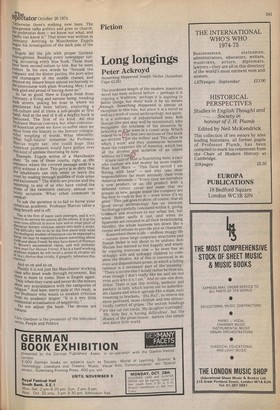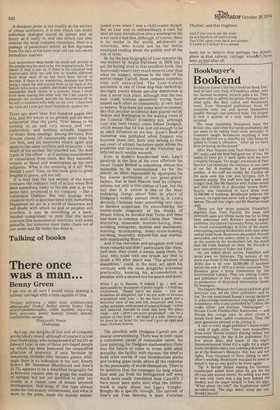Fiction
Long longings
Peter Ackroyd
Something Happened Joseph Heller (Jonathan Cape £3.25) The inordinate length of the modern American novel has been noticed before – perhaps it is copying a 'tradition,' perhaps it is aspiring to Aetter things, but sheer bulk is by no means ough. Something Happened is almost an exception to this rule, but since it is a novel as well as a work of social anthropology, not quite. It is a soliloquy of industrialised man, Bob Slocum (the pun may well be intentional), who recognises the triteness of his situation by
V behaving as e were in a comic-strip. Which indeed he is. he first two sections of this book are entitled get the willies' and 'The office in which I work' and they summarise between them the corporate life of America, which has all the dryness and isolation of an island without its Crusop
A new race of an is flourishing here, a race who confuse sex and money far more readily than Karl Marx – "This fiscal period I am flirting with Jane" – and who take their responsibilities far more seriously than even America demands – "Every time we introduce a new product, or an old product with a different colour, cover and name that we present as new, people inside the company are the first to rush to buy it – even when it's no good." This just goes to show, of course, that all good social anthropology has an intricate mythology carefully concealed within it, giving credence and structure to our urban lies; but when Heller spells it out, and when its ligaments are revealed in all their breathtaking banality, the whole business lies down like a corpse and refuses to provide plot or character. Somewhere there is life – endless, muggy life – outside these large corporate structures and Joseph Helier is not about to be undone. Bob Slocum has learned to live happily and wisely by copying everyone else – he even has an unhappy wife and unhappy children to complete the illusion. All of this is conveyed in an even and dispassionate prose, in which a falling cadence is a necessary part of the 'meaning': "There is no one else I would rather be than me, even though I don't really like me and am not even sure who it is I am." And no one else does, either. There isjust this writing, sardonic and pathetic in turn, which leaves out no subordinate clauses and which spreads like a stain, only resorting to brackets, "(Ha Ha)", to relieve the more profound, more childish and less syntactically correct of gripes. The section headings f are like cut-out cards, 'My daughter's unhappy', 'My little boy is having difficulties', but the shades of the prose-house darken this simple and direct little world.
A deadpan prose is not readily at the service of cheap sentiment; it is one which can make suburban dialogue sound as unreal and as funny as it really is, and one which can also conceal the most complex intentions. Here is a passage of passionate intent, as Bob digresses from the fate of his nine-year-old son into more immediate matters:
Lost somewhere deep inside his small self already is the smaller boy he used to be, the original article. Or is there? If that is not so, if there is no vanished and irretrievable little me and him so starkly different from what each of us has since been forced to become, if there is no wandering, desolate lost little being I yearn for and started from so far back in my history who took a sudden, inevitable lurch into some inacessible black recess at a moment when I must have been staring the other way, for I am unable to pinpoint the moment, and left, me disoriented all by myself to continue willy-nilly on my own — then how the fuck did I ever get here? Somebody pushed me.
There are more than five hundred pages like this, and the whole is no greater and no more substantial than the parts. Time seems to be coming to an end very slowly and very elaborately, and nothing actually happens to shake these musings among the ruins. Bob Slocum chews off considerably more than he can bite, and his memories return again and again to the same conflicts and situations — the death of his mother, his retarded son, the mad typist in the office' — as if seeking nourishment or consolation from them. But they naturally remain as bland and meaningless as his own solipsism. What is the meaning of it all? Why should I care? Time, as this book goes to great lengths to prove, will not tell. It is true that the last section of the novel contains the remotest hint of action when Bob does something nasty to his son and is, at the same time, promoted in his company — like a transverse Oedipus. But any analogy with classical myth is spurious since with Something Happened we are in a world of flatulence and self-doubt with which no god or prophet will interfere. It may be something of a backhanded compliment to note that the novel conveys this monumental inactivity with some panache, but someone must make chaos out of our order and Mr Heller has done it.











































 Previous page
Previous page